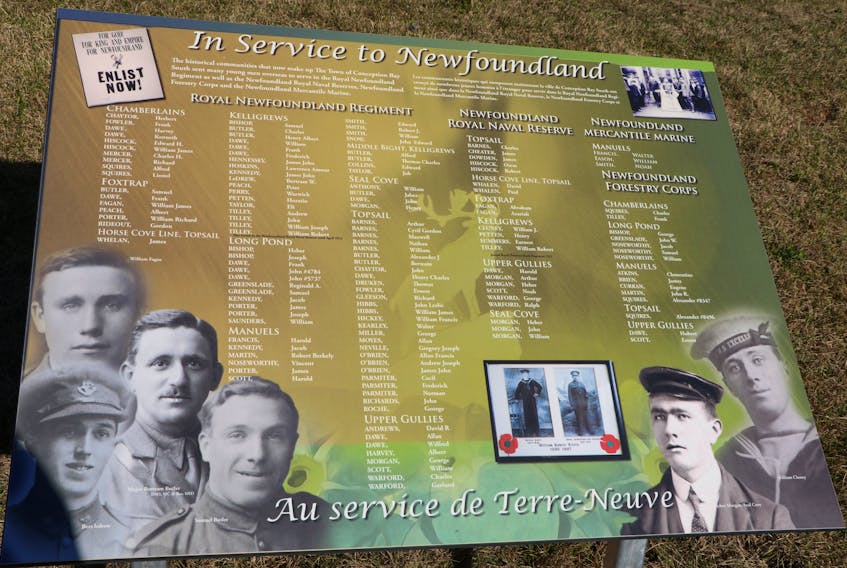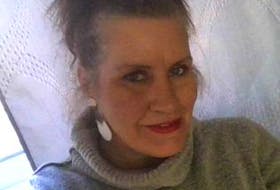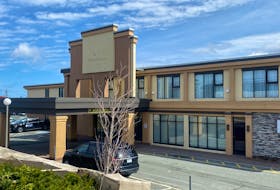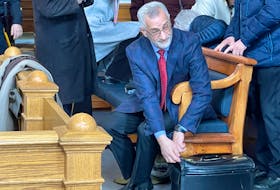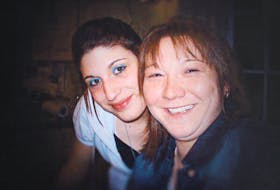One hundred years ago this Sunday, the official end to the First World War came with the signing of the Armistice in a cramped rail car at the city of Compiegne, France, by officials representing the Allies and Germany.
Signatures scrawled on a piece of paper. Bloodshed ended.
Dubbed in the newspapers of the time as the war to end all wars — it surely wasn’t — but it was an end to four years of hell on Earth that would leave deep, painful physical and emotional scars on those who survived the war, and on their families and communities, that exist to this very day.
The Evening Telegram on Nov. 11, 1918 carried a headline in bold across page 5 “GERMANY HAS SURRENDERED.”
In Newfoundland and Labrador, the loss was crippling. A young generation of men was wiped out and wounded. There were few outports and communities that didn’t lose a young person. Soldiers returning were immensely changed either physically after being wounded, or mentally.
A world war did what you’d imagine it would do — it changed the world and the people in it. It was freedom at a great cost. It changed Newfoundland and Labrador, and set it on an economic downturn. Some would argue it never fully recovered.
Lingering for lifetimes were the rumble of guns, the whistling of artillery, the swoosh of hot lead bullets flying all around. The pounding of earth, blinding showers of dirt and mud surrounding the cries of those hit. The blood and body parts.
They pushed on with a reluctant licence to kill, or be killed.
What those young men saw on the battlefield, how they continued on out of duty to King and Country, the courage and determination shown, has never been matched.

A world war did what you’d imagine it would do — it changed the world and the people in it. It was freedom at a great cost.
It changed Newfoundland and Labrador, and set it on an economic downturn. Some would argue it never fully recovered.
But in the weeks and months following the end of the war, it was a time for celebration.
The Royal Newfoundland Regiment had done Newfoundland and Labrador proud.
An entry in the regimental diary in February 1918 records a note from Field Marshall Sir Douglas Haig, Commander in Chief of the British armies in France, congratulating the regiment on being granted the title of “Royal” by the King.
“I have much pleasure in informing you that His Majesty the King, in view of the magnificent bravery and resolute determination shown by all ranks, has been graciously pleased to approve of the grant of the title ‘Royal’ to the Newfoundland Regiment. Please accept and convey to all ranks my warmest congratulations that your achievements have met with such well-earned recognition. Official intimation will be sent you, and this is merely a personal message from myself to your gallant regiment.”
And it was also a time people wanted to know more about individual heroes such as Sgt. Tommy Ricketts and Lance Cpl. Matthew Brazil.
With their platoon pinned down by enemy fire and suffering casualties, Ricketts and Brazil volunteered to go forward to outflank a German battery. Their bravery resulted in not only driving the German battery back, but the taking of prisoners.
Ricketts, only 17 years of age at the time, was awarded the Victoria Cross for his actions, and Brazil was awarded the Distinguished Conduct Medal.
Ricketts was the youngest person in the British Army to have received Britain’s highest military honour.

Excitement grew in St. John’s, and the rest of Newfoundland and Labrador, when word spread of Ricketts coming home.
He was onboard the SS Corsican that was bringing Newfoundland Regiment soldiers home. The ship arrived at St. John’s harbour the evening of Feb. 7, 1919 to a reception that included fireworks, ships bells, and anxious crowds.
A young Evening Telegram reporter named Joey Smallwood reportedly was able to secure himself a spot on a small boat carrying officials out to the anchored Corsican to greet the troops, and start transferring troops to shore.
Smallwood’s aim was to secure an interview with Ricketts.
A story appeared in the next day’s paper, though there was no byline applied to the story, it’s assumed that reports are correct that it was indeed Smallwood’s work. Smallwood would later become famous for leading Newfoundland into Confederation with Canada and becoming the province’s first premier.
The interview was the first of only a few that Ricketts would grant in his lifetime.
In the article, it noted it took a half hour for Smallwood to find Ricketts among the “khaki-clad, cheering men.”
Ricketts told his story “with that straightforwardness and simplicity that always denotes the soldier,” the article stated and that, “it is plainly evident that he can see nothing specially unusual in the bravery he exhibited on the battlefield.”
In the article Ricketts, originally from White Bay, tells how he was motivated in the act by the death of his brother, Pte. George Ricketts, that occurred in an earlier battle.
Ricketts and Brazil advanced with a Lewis gun in an attempt to outflank the German battery near the village of Drie-Masten while their fellow soldiers were pinned down in a small ditch on the farmer’s filed.
Advancing by short rushes under heavy machine gun fire, the Lewis gun ammunition ran out while Ricketts and Brazil were still 300 yards from the German battery.
Ricketts doubled back to get more ammunition all the while being targeted by the Germans. Returning to the Lewis gun with the ammunition, he found that Brazil had moved forward.
Still under heavy fire, Ricketts reloaded the Lewis gun, and by accurate shooting at the enemy battery drove their gun teams onto a farmhouse. Ricketts continued to advance upon the enemy by shooting his Lewis gun from the hip and took the Germans prisoner.
Saved many lives
Ricketts and Brazil from Spaniard's Bay, are credited with saving many lives and allowing their platoon to continue the advance and capture four field guns, four machine guns and take eight prisoners, while the platoon went on to reach its objective which was a section of the railway line.
After the war, Ricketts settled in the St. John's area and Brazil went back to Spaniard's Bay. Ricketts tired of the fame of being a Victoria Cross winner and only wanted to get an education. He would go on the become a pharmacist in St. John’s and rarely speak about the war.
He and Brazil would remain close friends.
This year, as part of a display at The Rooms in St. John’s, the war medals of Ricketts and Brazil are on display together.
Brazil's daughters Joan Ryan, 83, and Eileen Woodford, 79, said there were no words to describe the feeling of seeing their father honoured in such a way.
The daughters said their father often visited Ricketts when he came to St. John’s.
"My father didn't talk too much about the war,” Eileen said. “If he had a sore throat or anything, he went to see Tommy Ricketts at the drug store.”
The daughters noted that Brazil died on Feb. 6, 1958. In the days Brazil was in hospital leading up to his death, the daughters say Ricketts was often at his side.
As Newfoundland’s economy sank into recession, the real impact of the heavy financial burden of the war and the loss of so many youth set in.
One wonders what Ricketts and Brazil, and other veterans spoke about when they met up.
The true cost of the First World War to what was then a colony of Great Britain was and is still debated since the end of the war.
Newfoundland is reported to have contributed $15 million to the war effort, quite a significant amount in those years. The costs would grow over the years and ultimately lead to the loss of Newfoundland’s independence, laying the foundation for the option chosen to proceed in the future, Confederation with Canada.
See SaltWire Network's special coverage marking The 11th Hour HERE

